Research Report: Tower Hotel's Supply Chain Management Post-Pandemic
VerifiedAdded on 2023/06/10
|24
|5841
|499
Report
AI Summary
This research report investigates the impact of the COVID-19 pandemic on the supply chain management of Tower Hotel, a five-star hotel in London. It examines the concept of supply chain management within the UK hospitality industry, identifies the specific challenges faced by Tower Hotel, and evaluates strategies for overcoming these challenges. The report uses literature review and data analysis to explore the disruption caused by COVID-19, including decreased revenue, difficulties in managing resources and staffing, and the need to adapt to changing customer needs. Recommendations focus on cost management, employee recruitment, and building strong supplier relationships to enhance resilience and ensure effective supply chain operations post-pandemic. The research aims to provide insights and practical solutions for hotels in the hospitality industry to recover and improve their supply chain management in the face of future uncertainties. Desklib provides this assignment as a study resource, offering solved assignments and past papers for students.
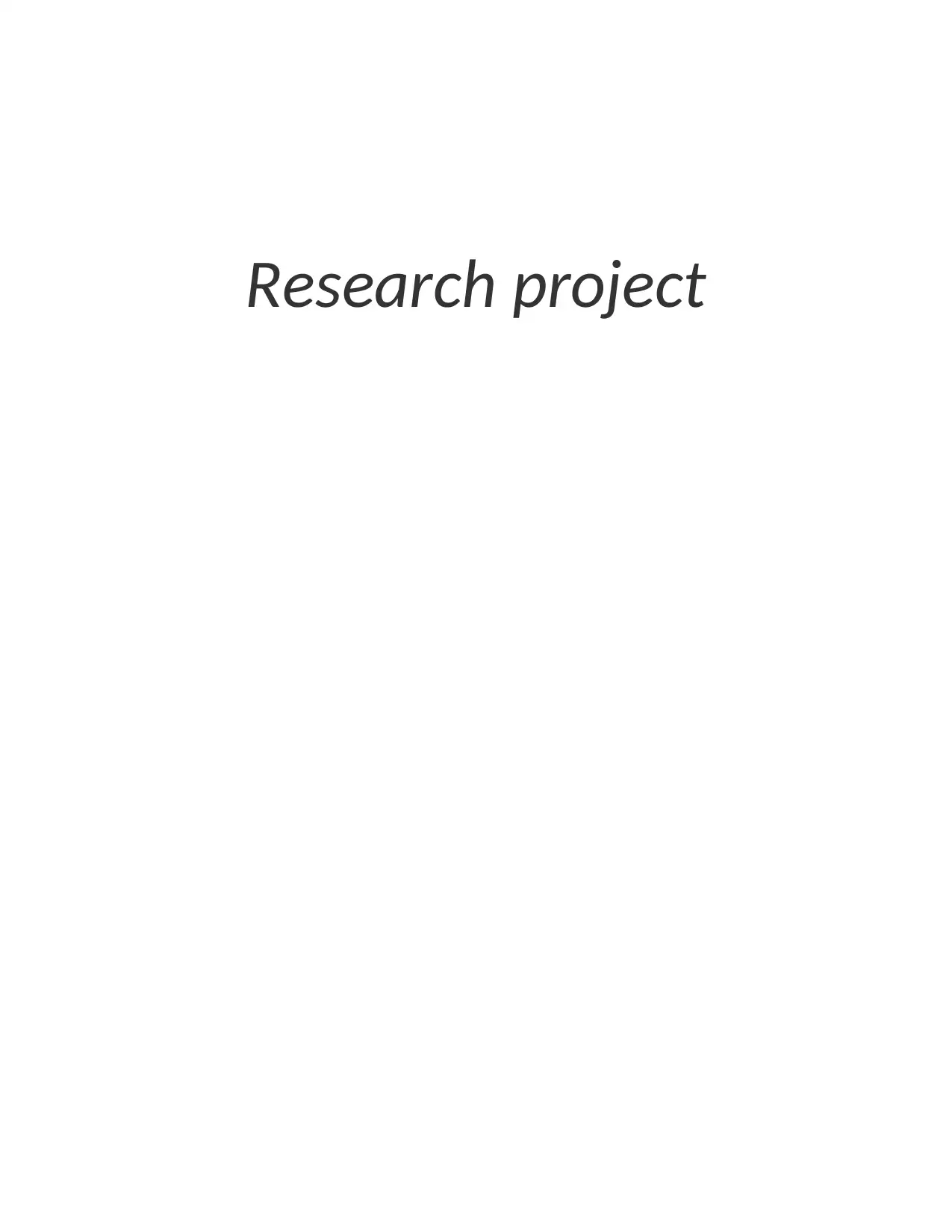
Research project
Paraphrase This Document
Need a fresh take? Get an instant paraphrase of this document with our AI Paraphraser
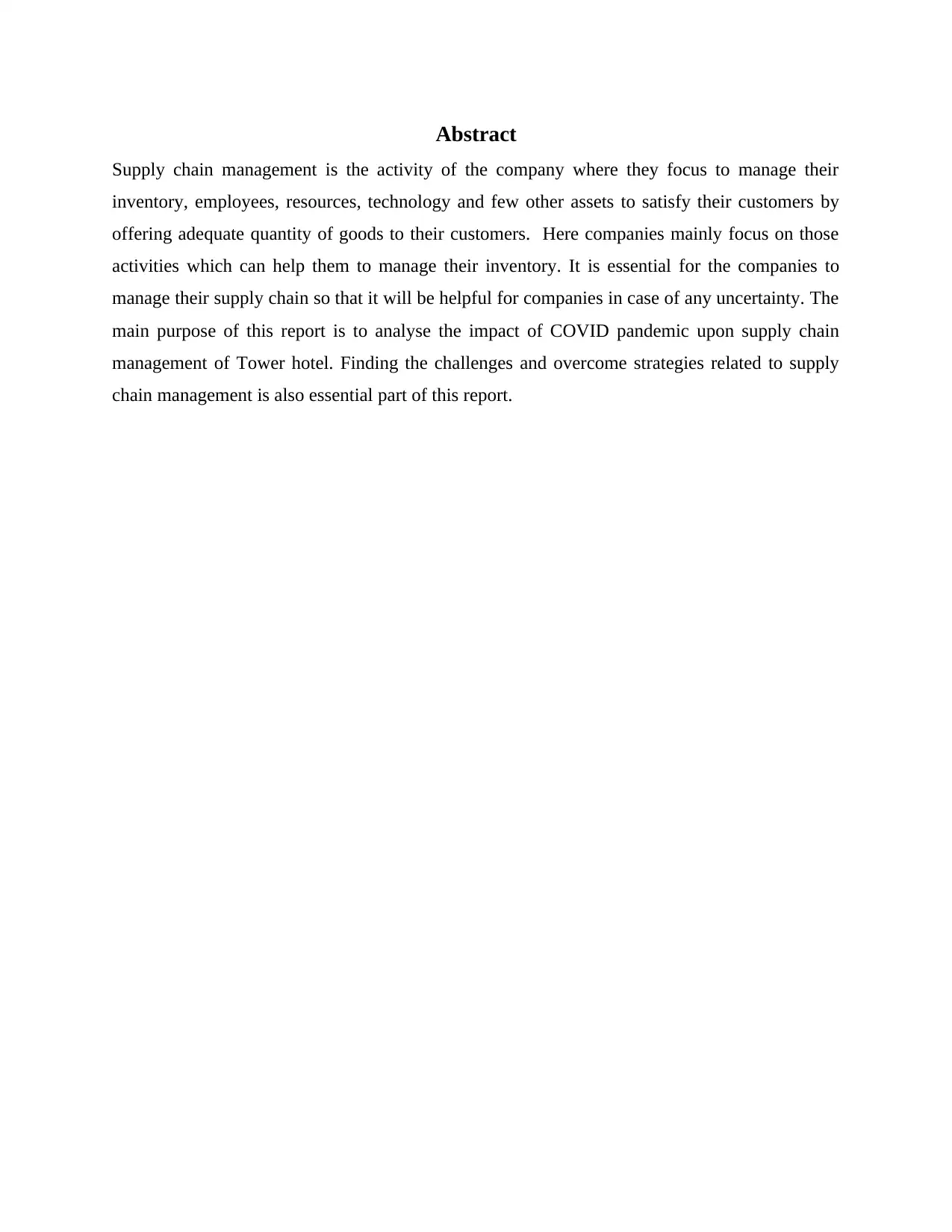
Abstract
Supply chain management is the activity of the company where they focus to manage their
inventory, employees, resources, technology and few other assets to satisfy their customers by
offering adequate quantity of goods to their customers. Here companies mainly focus on those
activities which can help them to manage their inventory. It is essential for the companies to
manage their supply chain so that it will be helpful for companies in case of any uncertainty. The
main purpose of this report is to analyse the impact of COVID pandemic upon supply chain
management of Tower hotel. Finding the challenges and overcome strategies related to supply
chain management is also essential part of this report.
Supply chain management is the activity of the company where they focus to manage their
inventory, employees, resources, technology and few other assets to satisfy their customers by
offering adequate quantity of goods to their customers. Here companies mainly focus on those
activities which can help them to manage their inventory. It is essential for the companies to
manage their supply chain so that it will be helpful for companies in case of any uncertainty. The
main purpose of this report is to analyse the impact of COVID pandemic upon supply chain
management of Tower hotel. Finding the challenges and overcome strategies related to supply
chain management is also essential part of this report.
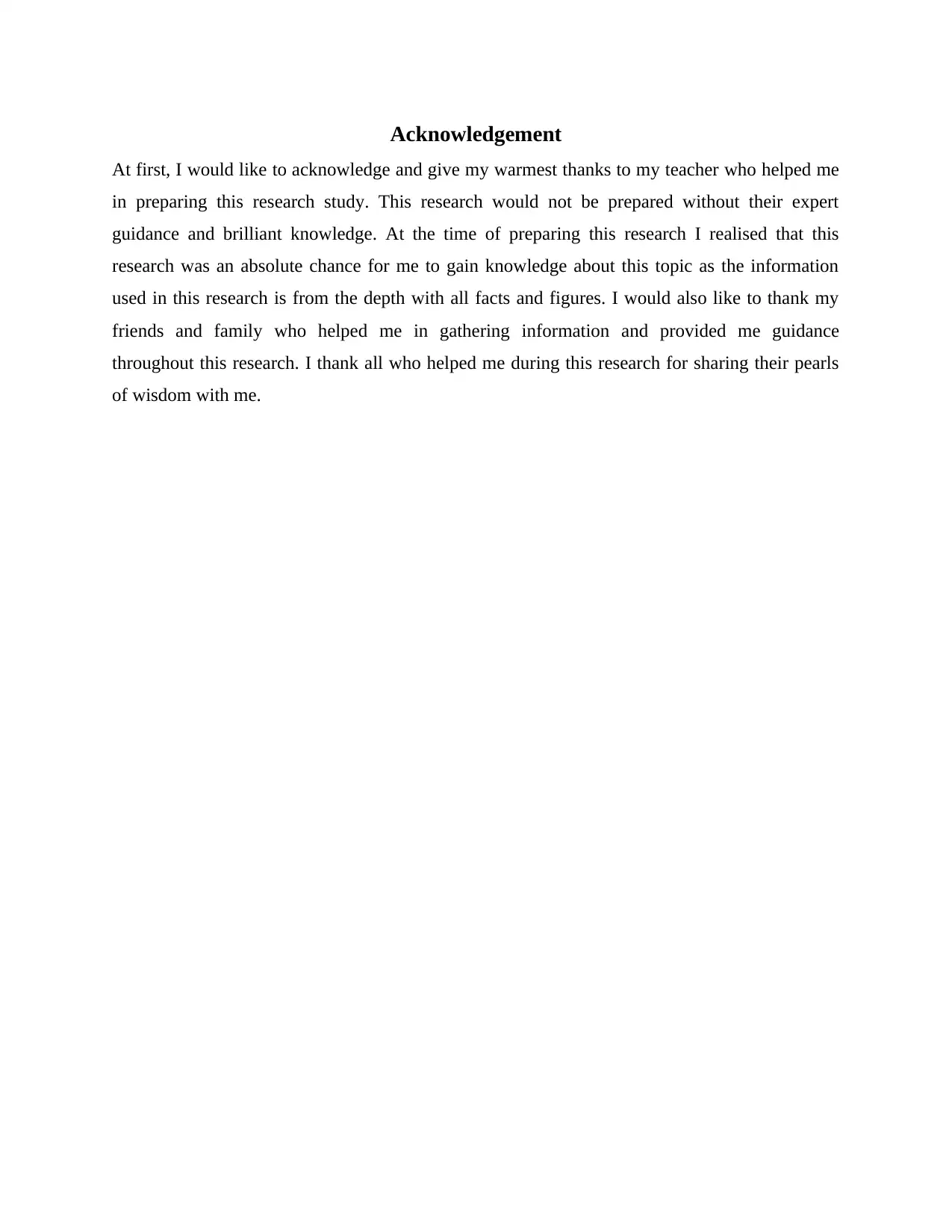
Acknowledgement
At first, I would like to acknowledge and give my warmest thanks to my teacher who helped me
in preparing this research study. This research would not be prepared without their expert
guidance and brilliant knowledge. At the time of preparing this research I realised that this
research was an absolute chance for me to gain knowledge about this topic as the information
used in this research is from the depth with all facts and figures. I would also like to thank my
friends and family who helped me in gathering information and provided me guidance
throughout this research. I thank all who helped me during this research for sharing their pearls
of wisdom with me.
At first, I would like to acknowledge and give my warmest thanks to my teacher who helped me
in preparing this research study. This research would not be prepared without their expert
guidance and brilliant knowledge. At the time of preparing this research I realised that this
research was an absolute chance for me to gain knowledge about this topic as the information
used in this research is from the depth with all facts and figures. I would also like to thank my
friends and family who helped me in gathering information and provided me guidance
throughout this research. I thank all who helped me during this research for sharing their pearls
of wisdom with me.
⊘ This is a preview!⊘
Do you want full access?
Subscribe today to unlock all pages.

Trusted by 1+ million students worldwide
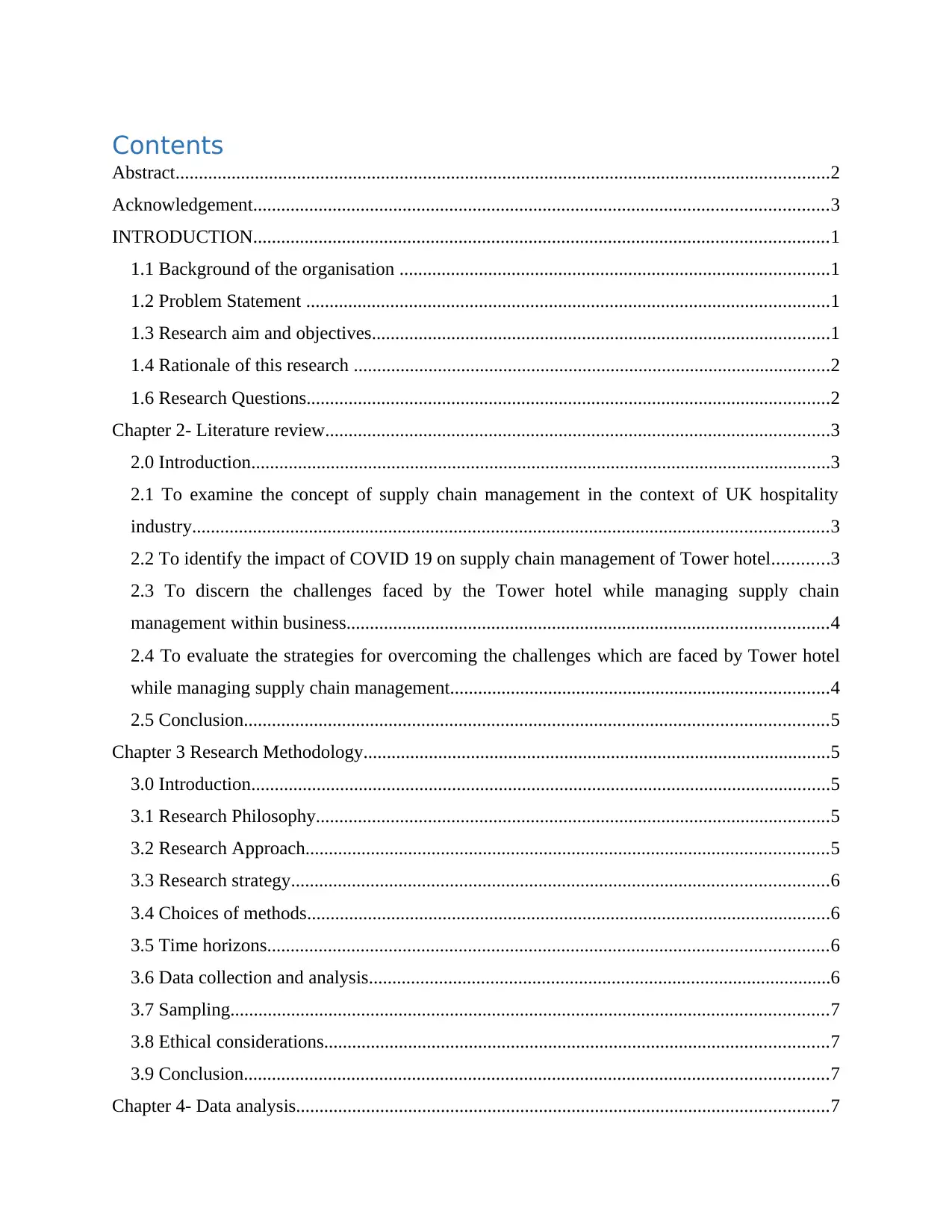
Contents
Abstract............................................................................................................................................2
Acknowledgement...........................................................................................................................3
INTRODUCTION...........................................................................................................................1
1.1 Background of the organisation ............................................................................................1
1.2 Problem Statement ................................................................................................................1
1.3 Research aim and objectives..................................................................................................1
1.4 Rationale of this research ......................................................................................................2
1.6 Research Questions................................................................................................................2
Chapter 2- Literature review............................................................................................................3
2.0 Introduction............................................................................................................................3
2.1 To examine the concept of supply chain management in the context of UK hospitality
industry........................................................................................................................................3
2.2 To identify the impact of COVID 19 on supply chain management of Tower hotel............3
2.3 To discern the challenges faced by the Tower hotel while managing supply chain
management within business.......................................................................................................4
2.4 To evaluate the strategies for overcoming the challenges which are faced by Tower hotel
while managing supply chain management.................................................................................4
2.5 Conclusion.............................................................................................................................5
Chapter 3 Research Methodology....................................................................................................5
3.0 Introduction............................................................................................................................5
3.1 Research Philosophy..............................................................................................................5
3.2 Research Approach................................................................................................................5
3.3 Research strategy...................................................................................................................6
3.4 Choices of methods................................................................................................................6
3.5 Time horizons........................................................................................................................6
3.6 Data collection and analysis...................................................................................................6
3.7 Sampling................................................................................................................................7
3.8 Ethical considerations............................................................................................................7
3.9 Conclusion.............................................................................................................................7
Chapter 4- Data analysis..................................................................................................................7
Abstract............................................................................................................................................2
Acknowledgement...........................................................................................................................3
INTRODUCTION...........................................................................................................................1
1.1 Background of the organisation ............................................................................................1
1.2 Problem Statement ................................................................................................................1
1.3 Research aim and objectives..................................................................................................1
1.4 Rationale of this research ......................................................................................................2
1.6 Research Questions................................................................................................................2
Chapter 2- Literature review............................................................................................................3
2.0 Introduction............................................................................................................................3
2.1 To examine the concept of supply chain management in the context of UK hospitality
industry........................................................................................................................................3
2.2 To identify the impact of COVID 19 on supply chain management of Tower hotel............3
2.3 To discern the challenges faced by the Tower hotel while managing supply chain
management within business.......................................................................................................4
2.4 To evaluate the strategies for overcoming the challenges which are faced by Tower hotel
while managing supply chain management.................................................................................4
2.5 Conclusion.............................................................................................................................5
Chapter 3 Research Methodology....................................................................................................5
3.0 Introduction............................................................................................................................5
3.1 Research Philosophy..............................................................................................................5
3.2 Research Approach................................................................................................................5
3.3 Research strategy...................................................................................................................6
3.4 Choices of methods................................................................................................................6
3.5 Time horizons........................................................................................................................6
3.6 Data collection and analysis...................................................................................................6
3.7 Sampling................................................................................................................................7
3.8 Ethical considerations............................................................................................................7
3.9 Conclusion.............................................................................................................................7
Chapter 4- Data analysis..................................................................................................................7
Paraphrase This Document
Need a fresh take? Get an instant paraphrase of this document with our AI Paraphraser
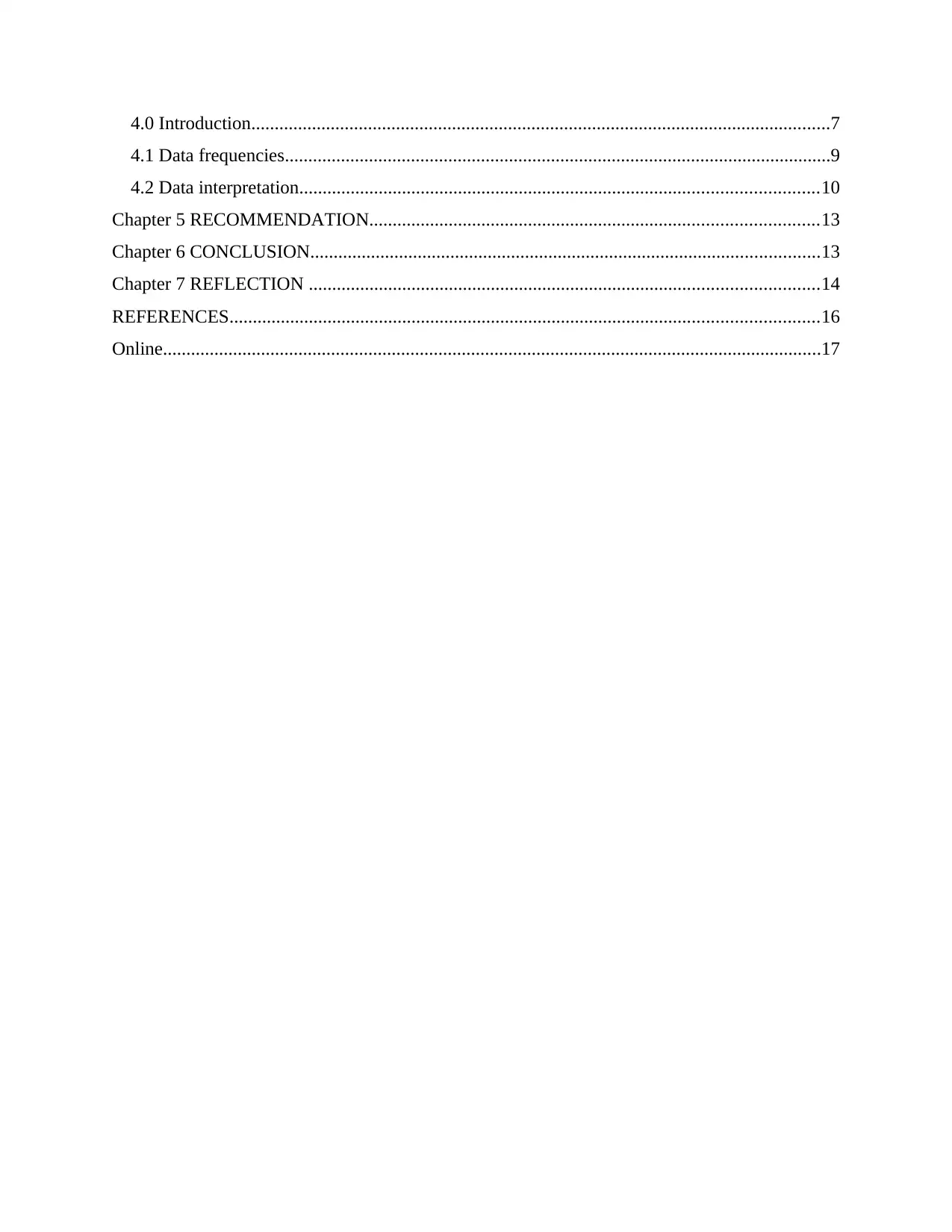
4.0 Introduction............................................................................................................................7
4.1 Data frequencies.....................................................................................................................9
4.2 Data interpretation...............................................................................................................10
Chapter 5 RECOMMENDATION................................................................................................13
Chapter 6 CONCLUSION.............................................................................................................13
Chapter 7 REFLECTION .............................................................................................................14
REFERENCES..............................................................................................................................16
Online.............................................................................................................................................17
4.1 Data frequencies.....................................................................................................................9
4.2 Data interpretation...............................................................................................................10
Chapter 5 RECOMMENDATION................................................................................................13
Chapter 6 CONCLUSION.............................................................................................................13
Chapter 7 REFLECTION .............................................................................................................14
REFERENCES..............................................................................................................................16
Online.............................................................................................................................................17
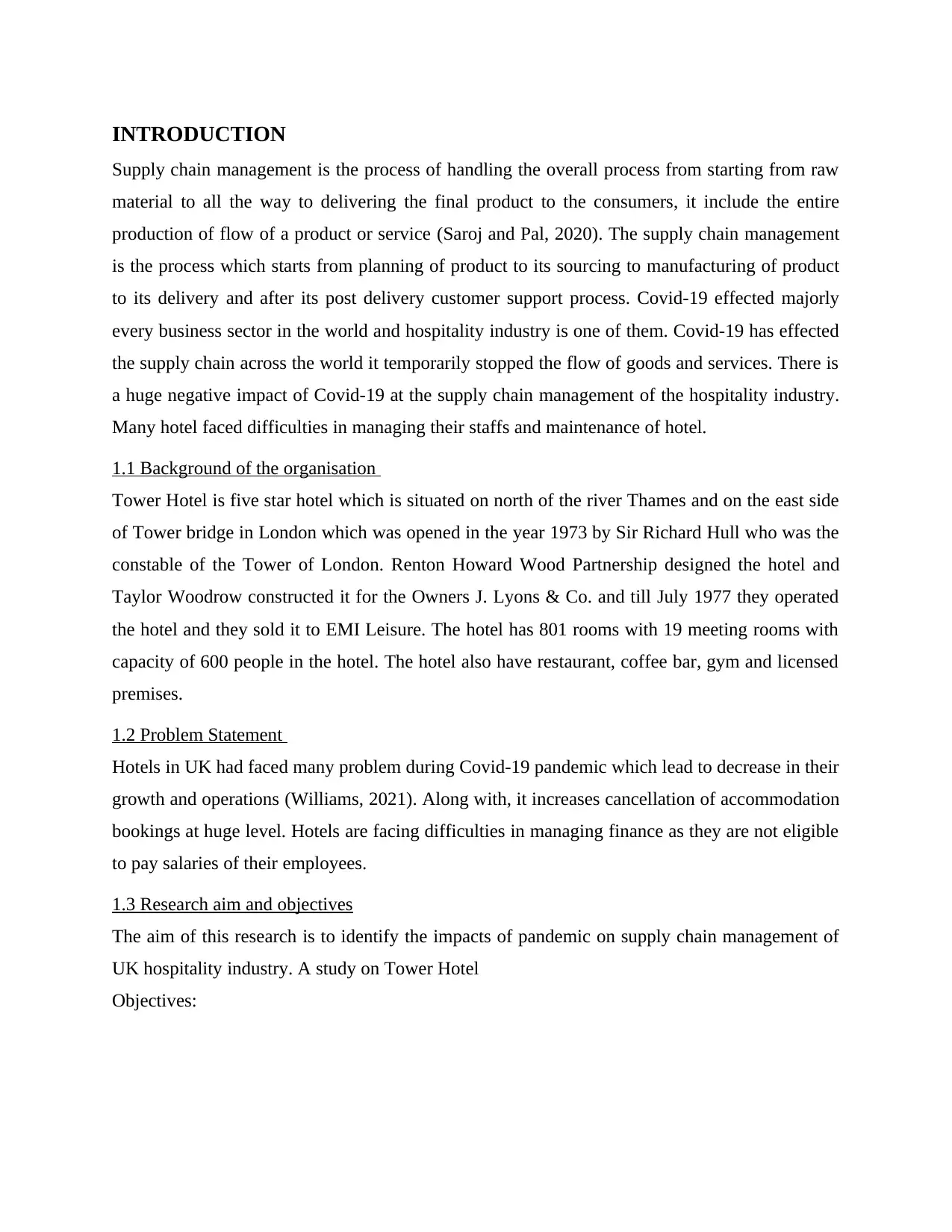
INTRODUCTION
Supply chain management is the process of handling the overall process from starting from raw
material to all the way to delivering the final product to the consumers, it include the entire
production of flow of a product or service (Saroj and Pal, 2020). The supply chain management
is the process which starts from planning of product to its sourcing to manufacturing of product
to its delivery and after its post delivery customer support process. Covid-19 effected majorly
every business sector in the world and hospitality industry is one of them. Covid-19 has effected
the supply chain across the world it temporarily stopped the flow of goods and services. There is
a huge negative impact of Covid-19 at the supply chain management of the hospitality industry.
Many hotel faced difficulties in managing their staffs and maintenance of hotel.
1.1 Background of the organisation
Tower Hotel is five star hotel which is situated on north of the river Thames and on the east side
of Tower bridge in London which was opened in the year 1973 by Sir Richard Hull who was the
constable of the Tower of London. Renton Howard Wood Partnership designed the hotel and
Taylor Woodrow constructed it for the Owners J. Lyons & Co. and till July 1977 they operated
the hotel and they sold it to EMI Leisure. The hotel has 801 rooms with 19 meeting rooms with
capacity of 600 people in the hotel. The hotel also have restaurant, coffee bar, gym and licensed
premises.
1.2 Problem Statement
Hotels in UK had faced many problem during Covid-19 pandemic which lead to decrease in their
growth and operations (Williams, 2021). Along with, it increases cancellation of accommodation
bookings at huge level. Hotels are facing difficulties in managing finance as they are not eligible
to pay salaries of their employees.
1.3 Research aim and objectives
The aim of this research is to identify the impacts of pandemic on supply chain management of
UK hospitality industry. A study on Tower Hotel
Objectives:
Supply chain management is the process of handling the overall process from starting from raw
material to all the way to delivering the final product to the consumers, it include the entire
production of flow of a product or service (Saroj and Pal, 2020). The supply chain management
is the process which starts from planning of product to its sourcing to manufacturing of product
to its delivery and after its post delivery customer support process. Covid-19 effected majorly
every business sector in the world and hospitality industry is one of them. Covid-19 has effected
the supply chain across the world it temporarily stopped the flow of goods and services. There is
a huge negative impact of Covid-19 at the supply chain management of the hospitality industry.
Many hotel faced difficulties in managing their staffs and maintenance of hotel.
1.1 Background of the organisation
Tower Hotel is five star hotel which is situated on north of the river Thames and on the east side
of Tower bridge in London which was opened in the year 1973 by Sir Richard Hull who was the
constable of the Tower of London. Renton Howard Wood Partnership designed the hotel and
Taylor Woodrow constructed it for the Owners J. Lyons & Co. and till July 1977 they operated
the hotel and they sold it to EMI Leisure. The hotel has 801 rooms with 19 meeting rooms with
capacity of 600 people in the hotel. The hotel also have restaurant, coffee bar, gym and licensed
premises.
1.2 Problem Statement
Hotels in UK had faced many problem during Covid-19 pandemic which lead to decrease in their
growth and operations (Williams, 2021). Along with, it increases cancellation of accommodation
bookings at huge level. Hotels are facing difficulties in managing finance as they are not eligible
to pay salaries of their employees.
1.3 Research aim and objectives
The aim of this research is to identify the impacts of pandemic on supply chain management of
UK hospitality industry. A study on Tower Hotel
Objectives:
⊘ This is a preview!⊘
Do you want full access?
Subscribe today to unlock all pages.

Trusted by 1+ million students worldwide
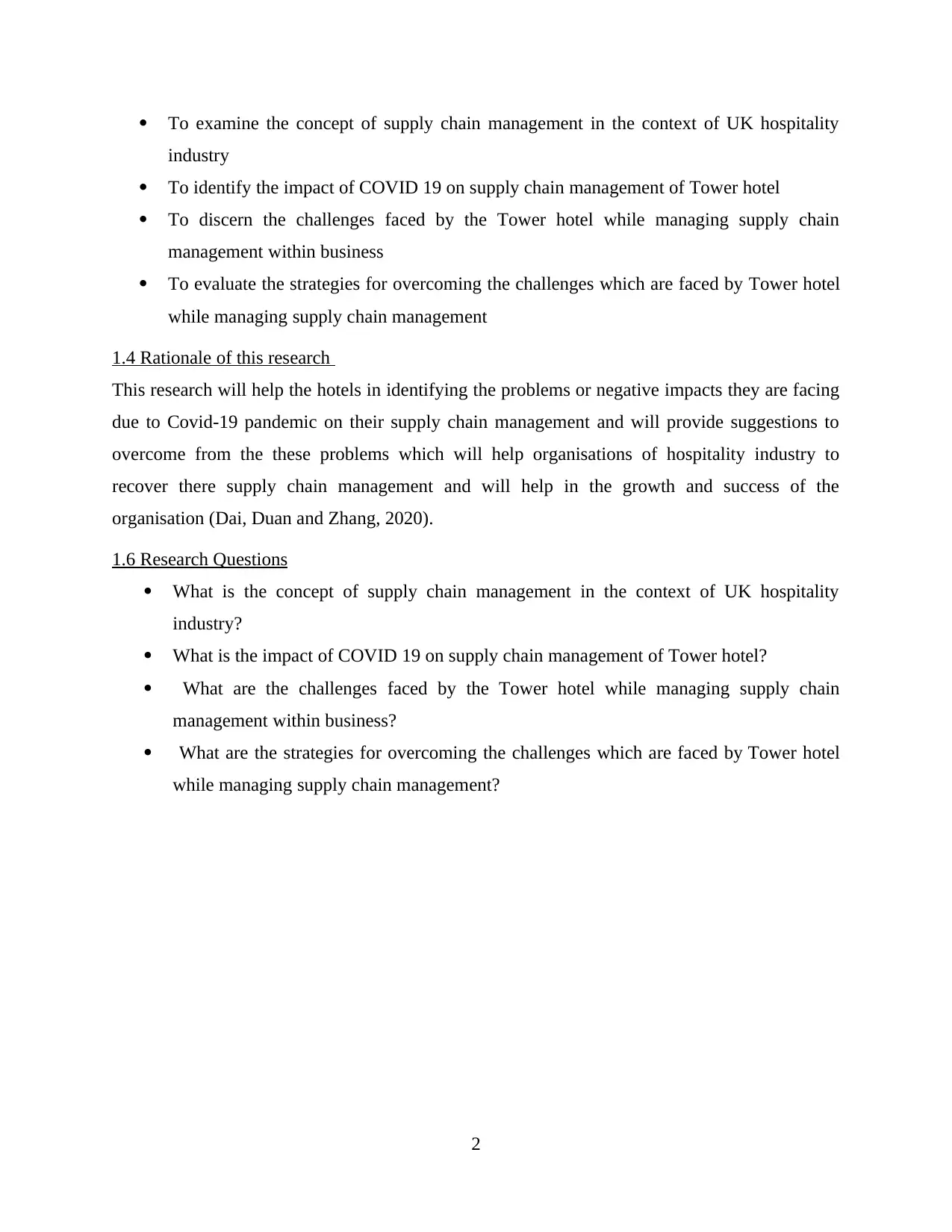
To examine the concept of supply chain management in the context of UK hospitality
industry
To identify the impact of COVID 19 on supply chain management of Tower hotel
To discern the challenges faced by the Tower hotel while managing supply chain
management within business
To evaluate the strategies for overcoming the challenges which are faced by Tower hotel
while managing supply chain management
1.4 Rationale of this research
This research will help the hotels in identifying the problems or negative impacts they are facing
due to Covid-19 pandemic on their supply chain management and will provide suggestions to
overcome from the these problems which will help organisations of hospitality industry to
recover there supply chain management and will help in the growth and success of the
organisation (Dai, Duan and Zhang, 2020).
1.6 Research Questions
What is the concept of supply chain management in the context of UK hospitality
industry?
What is the impact of COVID 19 on supply chain management of Tower hotel?
What are the challenges faced by the Tower hotel while managing supply chain
management within business?
What are the strategies for overcoming the challenges which are faced by Tower hotel
while managing supply chain management?
2
industry
To identify the impact of COVID 19 on supply chain management of Tower hotel
To discern the challenges faced by the Tower hotel while managing supply chain
management within business
To evaluate the strategies for overcoming the challenges which are faced by Tower hotel
while managing supply chain management
1.4 Rationale of this research
This research will help the hotels in identifying the problems or negative impacts they are facing
due to Covid-19 pandemic on their supply chain management and will provide suggestions to
overcome from the these problems which will help organisations of hospitality industry to
recover there supply chain management and will help in the growth and success of the
organisation (Dai, Duan and Zhang, 2020).
1.6 Research Questions
What is the concept of supply chain management in the context of UK hospitality
industry?
What is the impact of COVID 19 on supply chain management of Tower hotel?
What are the challenges faced by the Tower hotel while managing supply chain
management within business?
What are the strategies for overcoming the challenges which are faced by Tower hotel
while managing supply chain management?
2
Paraphrase This Document
Need a fresh take? Get an instant paraphrase of this document with our AI Paraphraser
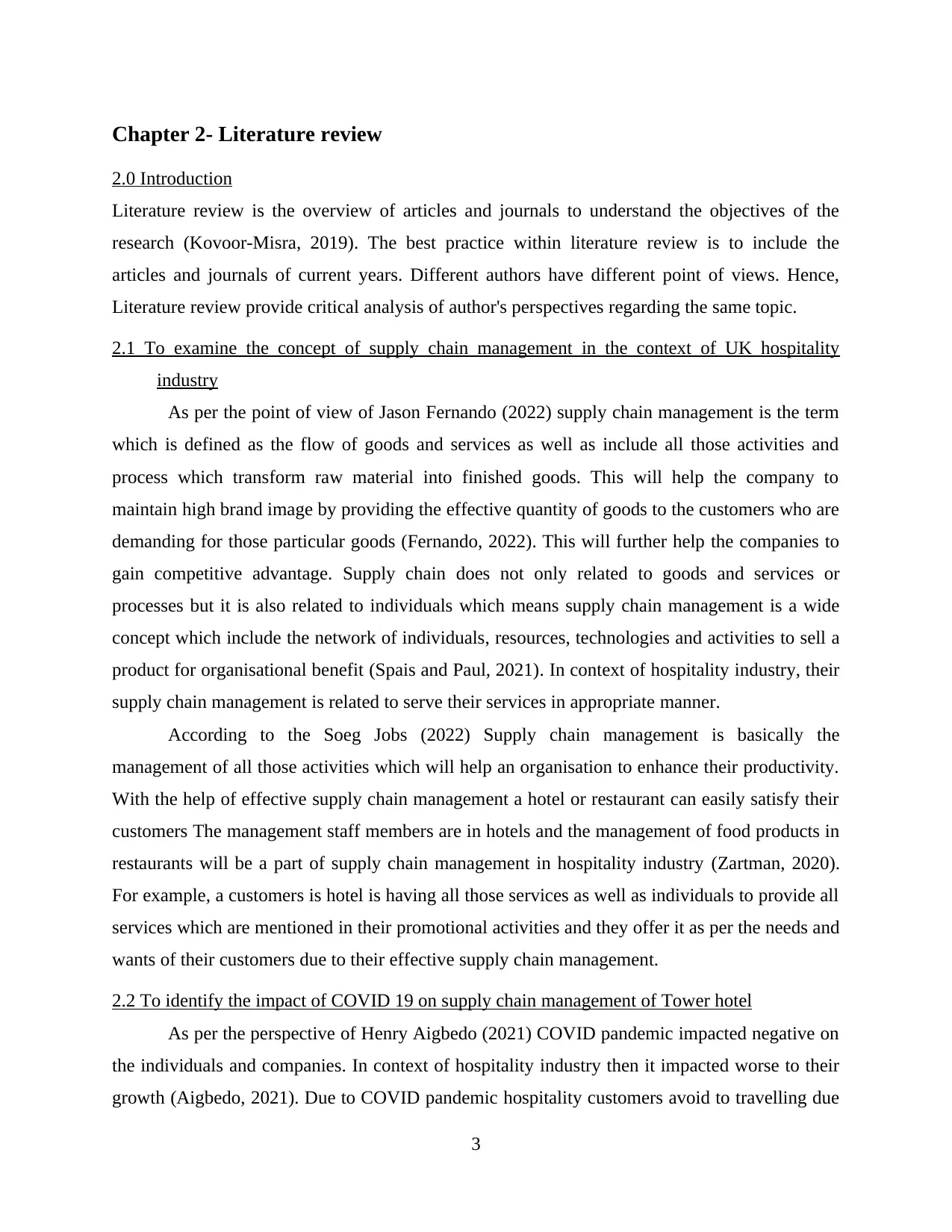
Chapter 2- Literature review
2.0 Introduction
Literature review is the overview of articles and journals to understand the objectives of the
research (Kovoor-Misra, 2019). The best practice within literature review is to include the
articles and journals of current years. Different authors have different point of views. Hence,
Literature review provide critical analysis of author's perspectives regarding the same topic.
2.1 To examine the concept of supply chain management in the context of UK hospitality
industry
As per the point of view of Jason Fernando (2022) supply chain management is the term
which is defined as the flow of goods and services as well as include all those activities and
process which transform raw material into finished goods. This will help the company to
maintain high brand image by providing the effective quantity of goods to the customers who are
demanding for those particular goods (Fernando, 2022). This will further help the companies to
gain competitive advantage. Supply chain does not only related to goods and services or
processes but it is also related to individuals which means supply chain management is a wide
concept which include the network of individuals, resources, technologies and activities to sell a
product for organisational benefit (Spais and Paul, 2021). In context of hospitality industry, their
supply chain management is related to serve their services in appropriate manner.
According to the Soeg Jobs (2022) Supply chain management is basically the
management of all those activities which will help an organisation to enhance their productivity.
With the help of effective supply chain management a hotel or restaurant can easily satisfy their
customers The management staff members are in hotels and the management of food products in
restaurants will be a part of supply chain management in hospitality industry (Zartman, 2020).
For example, a customers is hotel is having all those services as well as individuals to provide all
services which are mentioned in their promotional activities and they offer it as per the needs and
wants of their customers due to their effective supply chain management.
2.2 To identify the impact of COVID 19 on supply chain management of Tower hotel
As per the perspective of Henry Aigbedo (2021) COVID pandemic impacted negative on
the individuals and companies. In context of hospitality industry then it impacted worse to their
growth (Aigbedo, 2021). Due to COVID pandemic hospitality customers avoid to travelling due
3
2.0 Introduction
Literature review is the overview of articles and journals to understand the objectives of the
research (Kovoor-Misra, 2019). The best practice within literature review is to include the
articles and journals of current years. Different authors have different point of views. Hence,
Literature review provide critical analysis of author's perspectives regarding the same topic.
2.1 To examine the concept of supply chain management in the context of UK hospitality
industry
As per the point of view of Jason Fernando (2022) supply chain management is the term
which is defined as the flow of goods and services as well as include all those activities and
process which transform raw material into finished goods. This will help the company to
maintain high brand image by providing the effective quantity of goods to the customers who are
demanding for those particular goods (Fernando, 2022). This will further help the companies to
gain competitive advantage. Supply chain does not only related to goods and services or
processes but it is also related to individuals which means supply chain management is a wide
concept which include the network of individuals, resources, technologies and activities to sell a
product for organisational benefit (Spais and Paul, 2021). In context of hospitality industry, their
supply chain management is related to serve their services in appropriate manner.
According to the Soeg Jobs (2022) Supply chain management is basically the
management of all those activities which will help an organisation to enhance their productivity.
With the help of effective supply chain management a hotel or restaurant can easily satisfy their
customers The management staff members are in hotels and the management of food products in
restaurants will be a part of supply chain management in hospitality industry (Zartman, 2020).
For example, a customers is hotel is having all those services as well as individuals to provide all
services which are mentioned in their promotional activities and they offer it as per the needs and
wants of their customers due to their effective supply chain management.
2.2 To identify the impact of COVID 19 on supply chain management of Tower hotel
As per the perspective of Henry Aigbedo (2021) COVID pandemic impacted negative on
the individuals and companies. In context of hospitality industry then it impacted worse to their
growth (Aigbedo, 2021). Due to COVID pandemic hospitality customers avoid to travelling due
3
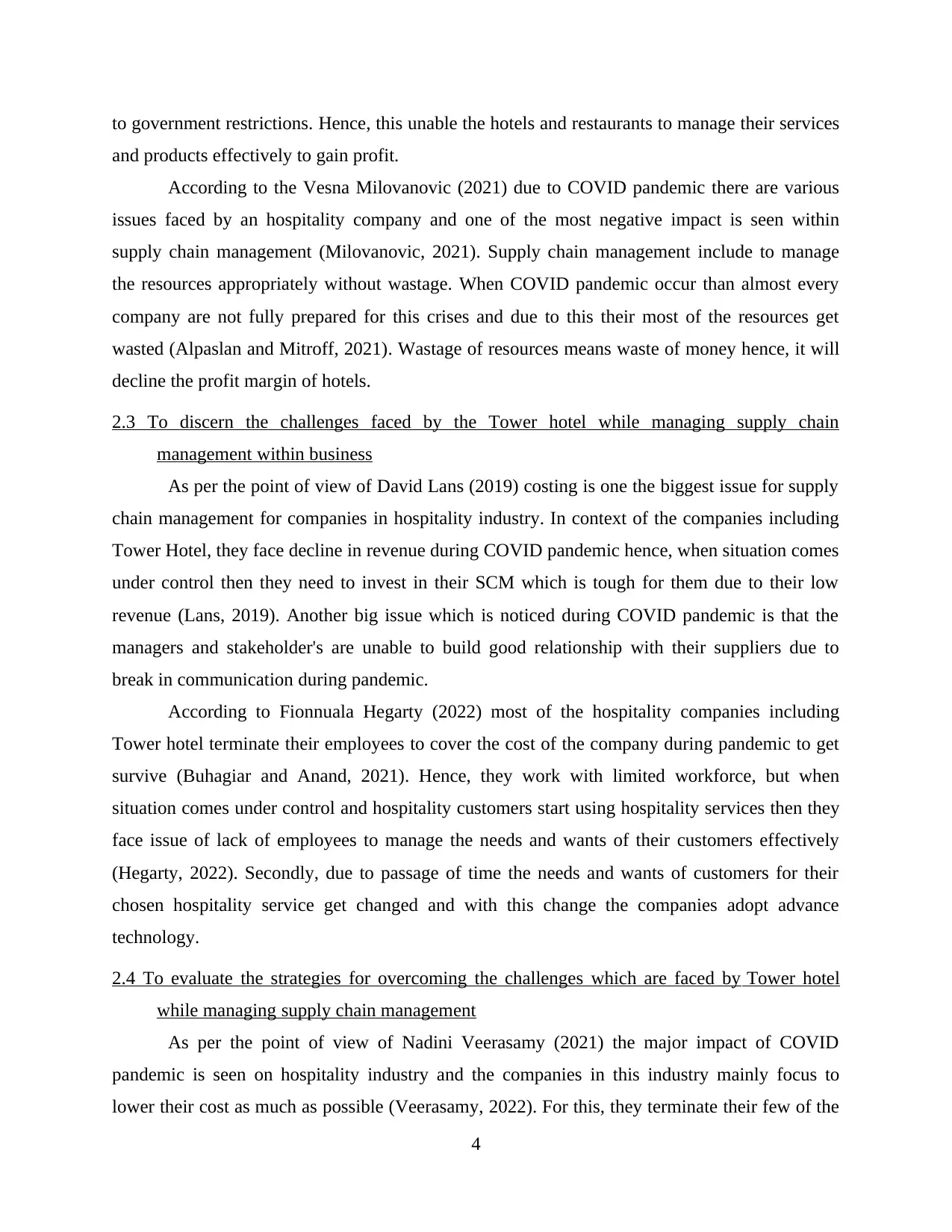
to government restrictions. Hence, this unable the hotels and restaurants to manage their services
and products effectively to gain profit.
According to the Vesna Milovanovic (2021) due to COVID pandemic there are various
issues faced by an hospitality company and one of the most negative impact is seen within
supply chain management (Milovanovic, 2021). Supply chain management include to manage
the resources appropriately without wastage. When COVID pandemic occur than almost every
company are not fully prepared for this crises and due to this their most of the resources get
wasted (Alpaslan and Mitroff, 2021). Wastage of resources means waste of money hence, it will
decline the profit margin of hotels.
2.3 To discern the challenges faced by the Tower hotel while managing supply chain
management within business
As per the point of view of David Lans (2019) costing is one the biggest issue for supply
chain management for companies in hospitality industry. In context of the companies including
Tower Hotel, they face decline in revenue during COVID pandemic hence, when situation comes
under control then they need to invest in their SCM which is tough for them due to their low
revenue (Lans, 2019). Another big issue which is noticed during COVID pandemic is that the
managers and stakeholder's are unable to build good relationship with their suppliers due to
break in communication during pandemic.
According to Fionnuala Hegarty (2022) most of the hospitality companies including
Tower hotel terminate their employees to cover the cost of the company during pandemic to get
survive (Buhagiar and Anand, 2021). Hence, they work with limited workforce, but when
situation comes under control and hospitality customers start using hospitality services then they
face issue of lack of employees to manage the needs and wants of their customers effectively
(Hegarty, 2022). Secondly, due to passage of time the needs and wants of customers for their
chosen hospitality service get changed and with this change the companies adopt advance
technology.
2.4 To evaluate the strategies for overcoming the challenges which are faced by Tower hotel
while managing supply chain management
As per the point of view of Nadini Veerasamy (2021) the major impact of COVID
pandemic is seen on hospitality industry and the companies in this industry mainly focus to
lower their cost as much as possible (Veerasamy, 2022). For this, they terminate their few of the
4
and products effectively to gain profit.
According to the Vesna Milovanovic (2021) due to COVID pandemic there are various
issues faced by an hospitality company and one of the most negative impact is seen within
supply chain management (Milovanovic, 2021). Supply chain management include to manage
the resources appropriately without wastage. When COVID pandemic occur than almost every
company are not fully prepared for this crises and due to this their most of the resources get
wasted (Alpaslan and Mitroff, 2021). Wastage of resources means waste of money hence, it will
decline the profit margin of hotels.
2.3 To discern the challenges faced by the Tower hotel while managing supply chain
management within business
As per the point of view of David Lans (2019) costing is one the biggest issue for supply
chain management for companies in hospitality industry. In context of the companies including
Tower Hotel, they face decline in revenue during COVID pandemic hence, when situation comes
under control then they need to invest in their SCM which is tough for them due to their low
revenue (Lans, 2019). Another big issue which is noticed during COVID pandemic is that the
managers and stakeholder's are unable to build good relationship with their suppliers due to
break in communication during pandemic.
According to Fionnuala Hegarty (2022) most of the hospitality companies including
Tower hotel terminate their employees to cover the cost of the company during pandemic to get
survive (Buhagiar and Anand, 2021). Hence, they work with limited workforce, but when
situation comes under control and hospitality customers start using hospitality services then they
face issue of lack of employees to manage the needs and wants of their customers effectively
(Hegarty, 2022). Secondly, due to passage of time the needs and wants of customers for their
chosen hospitality service get changed and with this change the companies adopt advance
technology.
2.4 To evaluate the strategies for overcoming the challenges which are faced by Tower hotel
while managing supply chain management
As per the point of view of Nadini Veerasamy (2021) the major impact of COVID
pandemic is seen on hospitality industry and the companies in this industry mainly focus to
lower their cost as much as possible (Veerasamy, 2022). For this, they terminate their few of the
4
⊘ This is a preview!⊘
Do you want full access?
Subscribe today to unlock all pages.

Trusted by 1+ million students worldwide
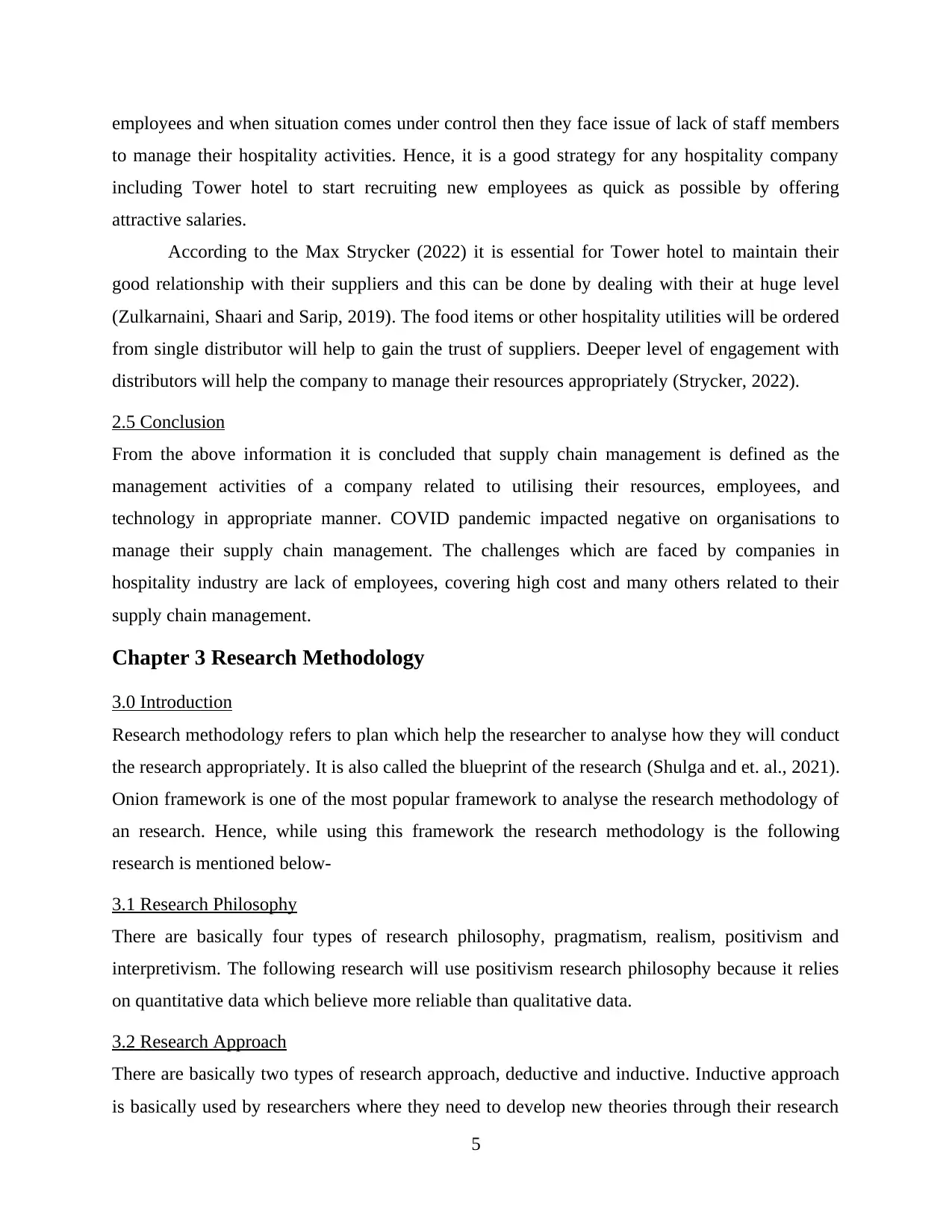
employees and when situation comes under control then they face issue of lack of staff members
to manage their hospitality activities. Hence, it is a good strategy for any hospitality company
including Tower hotel to start recruiting new employees as quick as possible by offering
attractive salaries.
According to the Max Strycker (2022) it is essential for Tower hotel to maintain their
good relationship with their suppliers and this can be done by dealing with their at huge level
(Zulkarnaini, Shaari and Sarip, 2019). The food items or other hospitality utilities will be ordered
from single distributor will help to gain the trust of suppliers. Deeper level of engagement with
distributors will help the company to manage their resources appropriately (Strycker, 2022).
2.5 Conclusion
From the above information it is concluded that supply chain management is defined as the
management activities of a company related to utilising their resources, employees, and
technology in appropriate manner. COVID pandemic impacted negative on organisations to
manage their supply chain management. The challenges which are faced by companies in
hospitality industry are lack of employees, covering high cost and many others related to their
supply chain management.
Chapter 3 Research Methodology
3.0 Introduction
Research methodology refers to plan which help the researcher to analyse how they will conduct
the research appropriately. It is also called the blueprint of the research (Shulga and et. al., 2021).
Onion framework is one of the most popular framework to analyse the research methodology of
an research. Hence, while using this framework the research methodology is the following
research is mentioned below-
3.1 Research Philosophy
There are basically four types of research philosophy, pragmatism, realism, positivism and
interpretivism. The following research will use positivism research philosophy because it relies
on quantitative data which believe more reliable than qualitative data.
3.2 Research Approach
There are basically two types of research approach, deductive and inductive. Inductive approach
is basically used by researchers where they need to develop new theories through their research
5
to manage their hospitality activities. Hence, it is a good strategy for any hospitality company
including Tower hotel to start recruiting new employees as quick as possible by offering
attractive salaries.
According to the Max Strycker (2022) it is essential for Tower hotel to maintain their
good relationship with their suppliers and this can be done by dealing with their at huge level
(Zulkarnaini, Shaari and Sarip, 2019). The food items or other hospitality utilities will be ordered
from single distributor will help to gain the trust of suppliers. Deeper level of engagement with
distributors will help the company to manage their resources appropriately (Strycker, 2022).
2.5 Conclusion
From the above information it is concluded that supply chain management is defined as the
management activities of a company related to utilising their resources, employees, and
technology in appropriate manner. COVID pandemic impacted negative on organisations to
manage their supply chain management. The challenges which are faced by companies in
hospitality industry are lack of employees, covering high cost and many others related to their
supply chain management.
Chapter 3 Research Methodology
3.0 Introduction
Research methodology refers to plan which help the researcher to analyse how they will conduct
the research appropriately. It is also called the blueprint of the research (Shulga and et. al., 2021).
Onion framework is one of the most popular framework to analyse the research methodology of
an research. Hence, while using this framework the research methodology is the following
research is mentioned below-
3.1 Research Philosophy
There are basically four types of research philosophy, pragmatism, realism, positivism and
interpretivism. The following research will use positivism research philosophy because it relies
on quantitative data which believe more reliable than qualitative data.
3.2 Research Approach
There are basically two types of research approach, deductive and inductive. Inductive approach
is basically used by researchers where they need to develop new theories through their research
5
Paraphrase This Document
Need a fresh take? Get an instant paraphrase of this document with our AI Paraphraser
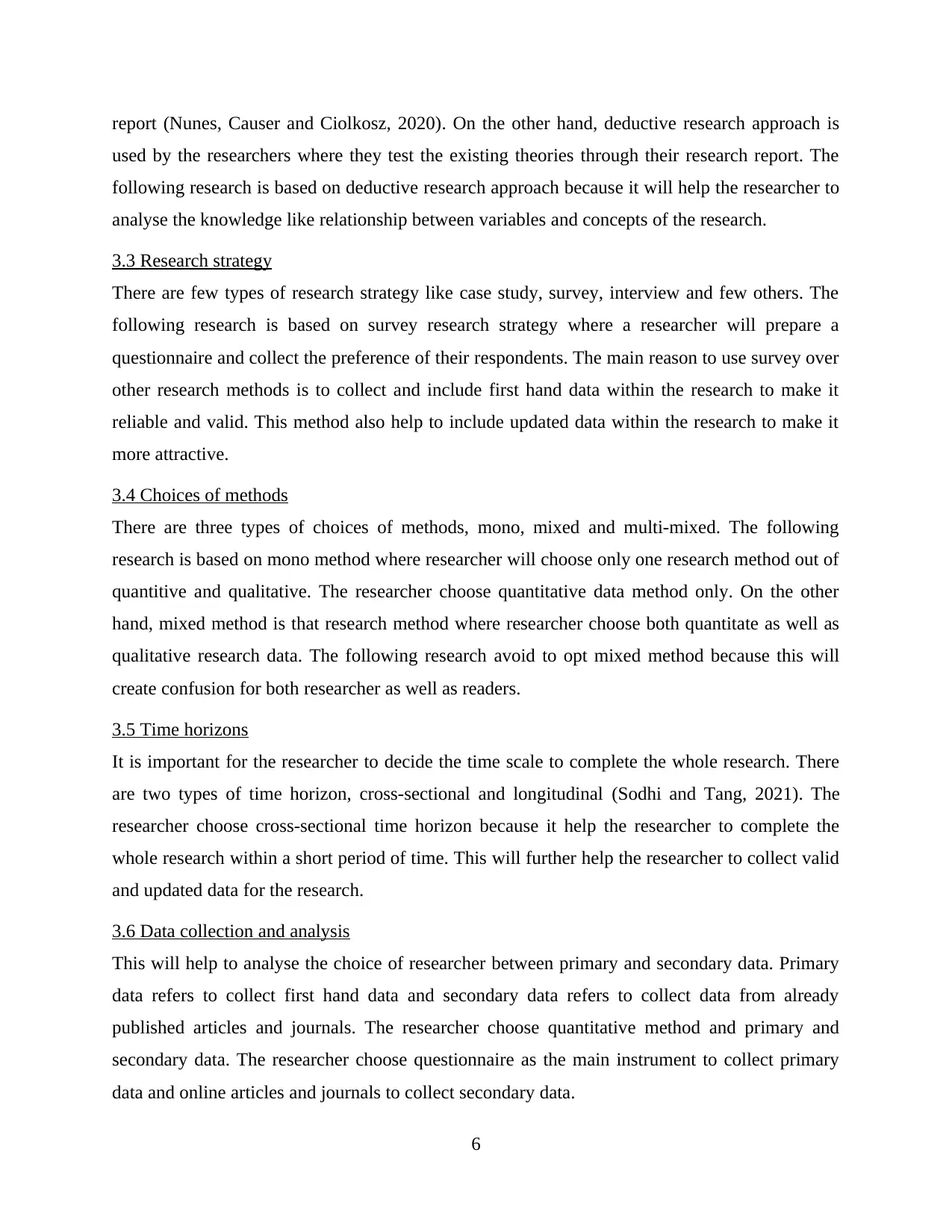
report (Nunes, Causer and Ciolkosz, 2020). On the other hand, deductive research approach is
used by the researchers where they test the existing theories through their research report. The
following research is based on deductive research approach because it will help the researcher to
analyse the knowledge like relationship between variables and concepts of the research.
3.3 Research strategy
There are few types of research strategy like case study, survey, interview and few others. The
following research is based on survey research strategy where a researcher will prepare a
questionnaire and collect the preference of their respondents. The main reason to use survey over
other research methods is to collect and include first hand data within the research to make it
reliable and valid. This method also help to include updated data within the research to make it
more attractive.
3.4 Choices of methods
There are three types of choices of methods, mono, mixed and multi-mixed. The following
research is based on mono method where researcher will choose only one research method out of
quantitive and qualitative. The researcher choose quantitative data method only. On the other
hand, mixed method is that research method where researcher choose both quantitate as well as
qualitative research data. The following research avoid to opt mixed method because this will
create confusion for both researcher as well as readers.
3.5 Time horizons
It is important for the researcher to decide the time scale to complete the whole research. There
are two types of time horizon, cross-sectional and longitudinal (Sodhi and Tang, 2021). The
researcher choose cross-sectional time horizon because it help the researcher to complete the
whole research within a short period of time. This will further help the researcher to collect valid
and updated data for the research.
3.6 Data collection and analysis
This will help to analyse the choice of researcher between primary and secondary data. Primary
data refers to collect first hand data and secondary data refers to collect data from already
published articles and journals. The researcher choose quantitative method and primary and
secondary data. The researcher choose questionnaire as the main instrument to collect primary
data and online articles and journals to collect secondary data.
6
used by the researchers where they test the existing theories through their research report. The
following research is based on deductive research approach because it will help the researcher to
analyse the knowledge like relationship between variables and concepts of the research.
3.3 Research strategy
There are few types of research strategy like case study, survey, interview and few others. The
following research is based on survey research strategy where a researcher will prepare a
questionnaire and collect the preference of their respondents. The main reason to use survey over
other research methods is to collect and include first hand data within the research to make it
reliable and valid. This method also help to include updated data within the research to make it
more attractive.
3.4 Choices of methods
There are three types of choices of methods, mono, mixed and multi-mixed. The following
research is based on mono method where researcher will choose only one research method out of
quantitive and qualitative. The researcher choose quantitative data method only. On the other
hand, mixed method is that research method where researcher choose both quantitate as well as
qualitative research data. The following research avoid to opt mixed method because this will
create confusion for both researcher as well as readers.
3.5 Time horizons
It is important for the researcher to decide the time scale to complete the whole research. There
are two types of time horizon, cross-sectional and longitudinal (Sodhi and Tang, 2021). The
researcher choose cross-sectional time horizon because it help the researcher to complete the
whole research within a short period of time. This will further help the researcher to collect valid
and updated data for the research.
3.6 Data collection and analysis
This will help to analyse the choice of researcher between primary and secondary data. Primary
data refers to collect first hand data and secondary data refers to collect data from already
published articles and journals. The researcher choose quantitative method and primary and
secondary data. The researcher choose questionnaire as the main instrument to collect primary
data and online articles and journals to collect secondary data.
6
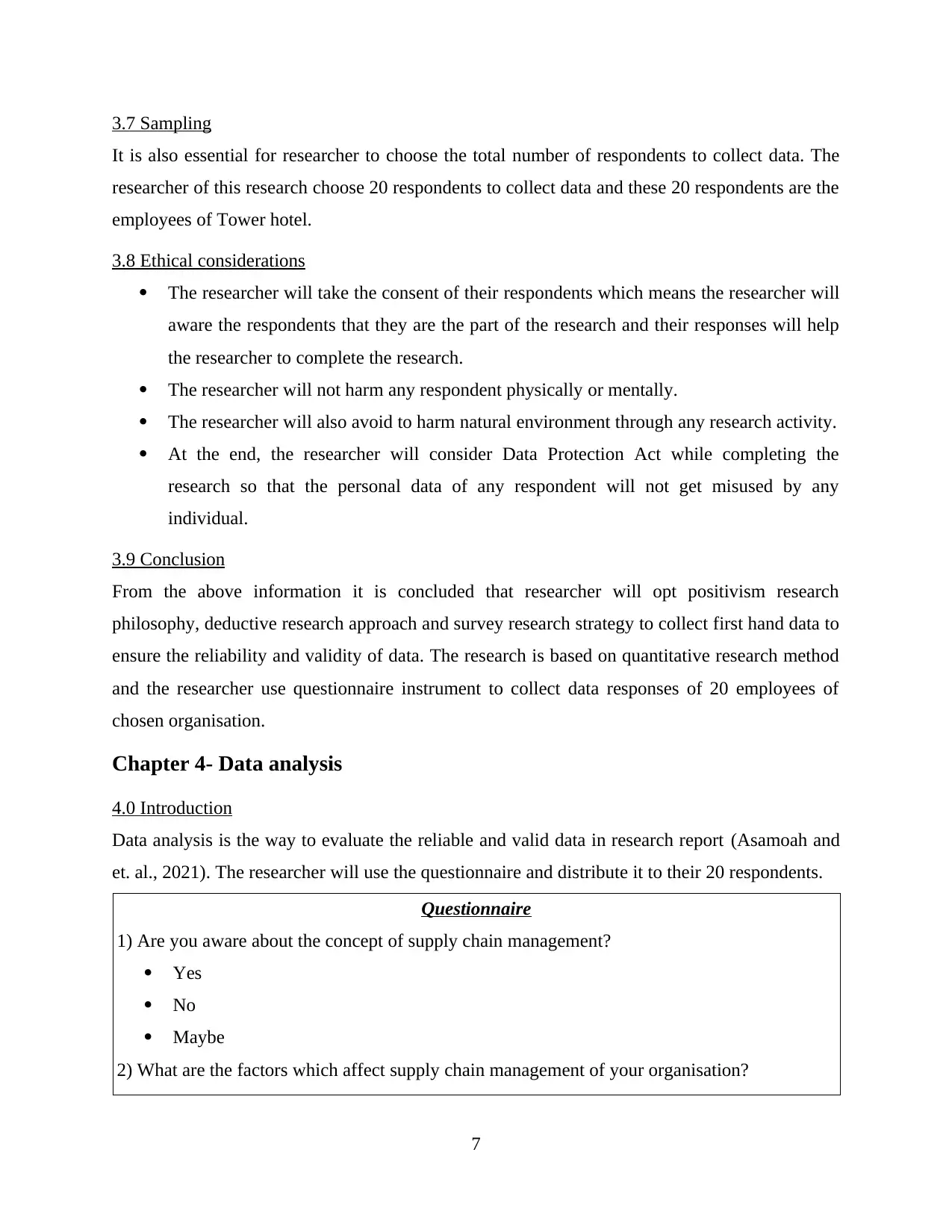
3.7 Sampling
It is also essential for researcher to choose the total number of respondents to collect data. The
researcher of this research choose 20 respondents to collect data and these 20 respondents are the
employees of Tower hotel.
3.8 Ethical considerations
The researcher will take the consent of their respondents which means the researcher will
aware the respondents that they are the part of the research and their responses will help
the researcher to complete the research.
The researcher will not harm any respondent physically or mentally.
The researcher will also avoid to harm natural environment through any research activity.
At the end, the researcher will consider Data Protection Act while completing the
research so that the personal data of any respondent will not get misused by any
individual.
3.9 Conclusion
From the above information it is concluded that researcher will opt positivism research
philosophy, deductive research approach and survey research strategy to collect first hand data to
ensure the reliability and validity of data. The research is based on quantitative research method
and the researcher use questionnaire instrument to collect data responses of 20 employees of
chosen organisation.
Chapter 4- Data analysis
4.0 Introduction
Data analysis is the way to evaluate the reliable and valid data in research report (Asamoah and
et. al., 2021). The researcher will use the questionnaire and distribute it to their 20 respondents.
Questionnaire
1) Are you aware about the concept of supply chain management?
Yes
No
Maybe
2) What are the factors which affect supply chain management of your organisation?
7
It is also essential for researcher to choose the total number of respondents to collect data. The
researcher of this research choose 20 respondents to collect data and these 20 respondents are the
employees of Tower hotel.
3.8 Ethical considerations
The researcher will take the consent of their respondents which means the researcher will
aware the respondents that they are the part of the research and their responses will help
the researcher to complete the research.
The researcher will not harm any respondent physically or mentally.
The researcher will also avoid to harm natural environment through any research activity.
At the end, the researcher will consider Data Protection Act while completing the
research so that the personal data of any respondent will not get misused by any
individual.
3.9 Conclusion
From the above information it is concluded that researcher will opt positivism research
philosophy, deductive research approach and survey research strategy to collect first hand data to
ensure the reliability and validity of data. The research is based on quantitative research method
and the researcher use questionnaire instrument to collect data responses of 20 employees of
chosen organisation.
Chapter 4- Data analysis
4.0 Introduction
Data analysis is the way to evaluate the reliable and valid data in research report (Asamoah and
et. al., 2021). The researcher will use the questionnaire and distribute it to their 20 respondents.
Questionnaire
1) Are you aware about the concept of supply chain management?
Yes
No
Maybe
2) What are the factors which affect supply chain management of your organisation?
7
⊘ This is a preview!⊘
Do you want full access?
Subscribe today to unlock all pages.

Trusted by 1+ million students worldwide
1 out of 24
Related Documents
Your All-in-One AI-Powered Toolkit for Academic Success.
+13062052269
info@desklib.com
Available 24*7 on WhatsApp / Email
![[object Object]](/_next/static/media/star-bottom.7253800d.svg)
Unlock your academic potential
Copyright © 2020–2026 A2Z Services. All Rights Reserved. Developed and managed by ZUCOL.





